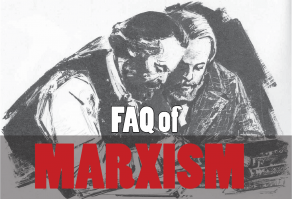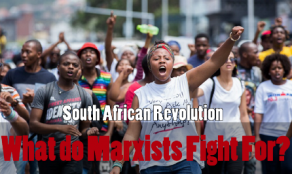Over the past few weeks student protests have flared up at several universities across the country. The immediate cause is the chronic crisis of the National Student Financial Aid Scheme. The NSFAS is beset with problems of corruption and mismanagement. As a result, it routinely fails to pay the required funds students need for their education.
On the 10th of March the state unleashed violence reminiscent of the heydays of Fees Must Fall in response to the protests. As a result, a by-stander by the name 0f Mthokozisi Ntumba was shot and killed in Johannesburg.
The actions of the ANC government has made it clear that the struggle of students is not a priority. This was evidenced by the cuts which were announced during the budget speech of the finance minister. The NSFAS budget being cut, creating a shortfall of 6.8 billion rand. This is part of a 24.1 billion rand cut of the national budget over the medium term. This cut to the higher education sector is a direct result of the deep crisis facing South African capitalism.
The government came up with all kinds of gimmicks like creating the Heher commission so they can appear to solve the crisis in higher education. In the end the Heher commission recommended privatising loans , i.e. that students should get loans from the banks, and once they reach a certain threshold when it comes to their income, then they can start paying back the loan.
What the commission recommended was the burdening of the studets with debt before they even start their working life. This recommendation would not be a drastic departure from the previous system which in fact tied students to these loans. Instead, this system was meant to be more rigid in terms of the recoupment of funds. The state effectively wanted to chain the future working class in a prison of debt which is owned by the big bourgeois.
It is on this premise where we see a split between the students and the professors in the intelligentsia. The watershed moment came when it was clear that the former president of the Republic of South Africa, Jacob Zuma, was going to deviate from the recommendations of the Heher commission by promising to fund students from poor and working class backgrounds. In the end, this was also a gimmick because he did not set out modalities for this, creating the flare up of the crisis we are in today.
The principle of free education was extended into the higher education sector by the Bolshevik movement which eventually seized power through a popular armed insurgency which culminated into what is now known as the Great October Socialist Revolution in 1917. Therefore, free education is necessary to develop the productive forces and cast the yoke of the capitalist education system, which turns humans into commodities of capital. The commodification of education is a natural development of capitalism and is therefore necessary to continue the subjugation of labour.
To keep labour under control, and in tow with the demands of the bourgeois, special bodies of armed men are utilised, as Engels and Lenin have consistently showed us in their classic works (The State and Revolution, and Origin of The Family, Private Property, and the State).
Like the labour force, students are also kept in check through organised violence in the form of these special bodies of armed men (police, army, and private security). In South African university campuses, private security is synonymous to the violence of the management. The minute private security is called, it is a clear sign that the management is not willing to negotiate and is ready to unleash the violence of the state since most of the universities are public institutions.
This has been happening in the past couple of days, with university managements taking it a step further by bringing in the public order police unit. These police officers are trained to suppress any event that disrupts public ‘order’.
The so-called public order police did not hesitate to do what they do best, and effectively killed a by-stander who was not even part of the protest! This trigger-happy group of police officers could not wait to unleash violence on unarmed students yet last year in Senekal they were afraid to bring order to a right wing, neo-fascist, and reactionary group of landowners. This highlights the reality that the state will always unleash violence towards the oppressed layers of society, confirming what Lenin said in The State and Revolution that, ‘The state is a product and a manifestation of the irreconcilability of class antagonisms.’ He goes on to say in another chapter that, “In a democratic republic, Engels continues, ‘wealth exercises its power indirectly, but all the more surely’, first by means of ‘direct corruption of officials’ (America); secondly, by means of an ‘alliance of the government and the Stock Exchange’ (France and America)”. Therefore, the State will do everything in its power to not only stop the advance of the student activists that demand free education but maintain the status quo which favours the ruling classes.
The lesson of the the #FeesMustFall movement is that the students should link up their struggle with the struggles of the working class. NSFAS exists to accommodate the working class, and the peasantry, and this ultimately means that your class status determines whether you will get an education or not. This means that class is the determining factor when it comes to getting an education, and any attack on NSFAS or any vehicle that funds the working class and the poor is an attack on the class itself!
This brings me to my next point on connecting the students’ struggle and the workers’ struggle, into one general struggle against the capitalist system. The students need to connect their struggle to the workers’ struggle by combining their demands into one programme. The workers are currently faced with a public sector wage freeze which comes at the backdrop of increasing standards of living due to an economic meltdown. The wage freeze is a spit in the face of the workers, who had hoped that by having an agreement with the state which predicted the crisis that at least the state will stick to their end of the bargain.
As we have seen, the state has not acceded to that, and even went as far as defending their case in court and won. This court win by the state against the working class has dealt a significant blow, which sees the established trade unions being paralyzed due to their endemic reformism. The entry of the EFF Labour Desk has injected the needed vigour to tackle the bourgeois class and has seen workers flood the Labour Desk with complaints which have not been resolved by the established trade unions. This platform also led a protest to express their anger towards the big tomato farm ZZ2, which has captured the unions, and the political elite who belong to the governing party, the African National Congress (ANC).
If students are serious about free quality, well resourced, and a socialist education system then they will connect their struggle with the workers. Recently the South African Federation of Trade Unions have come out to express solidarity with the student protests and have attended joint protests and workers. SAFTU has said correctly that the student fees issue is a working-class struggle. This is correct. The entry of the organised working class onto the scene of the university funding crisis will change the game. The first task is to mobilise the student movement, the labour movement and social movements behind the banner of free education by connecting the demands into a joint programme. The effective mobilisation of our other forces to support students would give the movement new momentum, and the potential to shut down the entire country’s main economic activities, to win the demand for free quality education
It is only through an alliance of the workers, peasants, and the oppressed layers that the students will win their struggle. The students can act as an auxiliary force to assist the movement, and increase the energy required to overthrow this rotten system. The students must align their demands to the interests of the working class. It is only through this alliance that we shall see a true, radical change in South Africa, and it is this alliance that shall usher in a socialist revolution.



